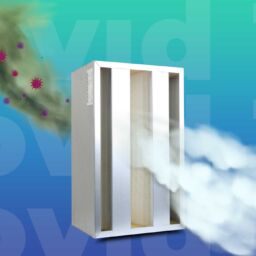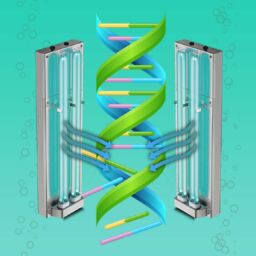
If you’re aware of all the ways having an air purifier in your house can improve your health, then you’ve probably browsed through dozens of buying guides in search of the perfect purifier for a healthy home environment.
But did you know there are risks to these products that just aren’t advertised on the labels of the purifiers you buy?
Before we jump into how air purifiers can be harmful and aggravate health conditions, let’s have a quick look at what air purifiers do, how they’re beneficial for us, and if air purifiers are really worth it!
What Do Air Purifiers Do For Your Health?
How Can Air Purifiers Improve Your Health?
In case you didn’t know, air purifiers can improve the quality of life of those suffering from diseases like pulmonary fibrosis.
(If you or someone you know is suffering from this disease, check out this article to find out which product is perfect for you!)
This is because an air purifier improves indoor air quality with the use of filters.
These filters trap tiny particles and air pollutants, like dust and pollen. Air pollutants, when left unchecked, are harmful to patients suffering from lung problems, as they can damage the lungs further.
However, even if you are of perfectly sound health, air purifiers are still worth having and can still play a beneficial part in your home.
According to University of Chicago’s Air Quality Life Index (AQLI), breathing unclean air is cutting your life expectancy by 1.8 years.
You can lower this number even further by cleansing the air you breathe in with the use of an air purifier. You can also avoid allergic rhinitis – better known as hay fever – by getting rid of its triggers from your indoor environment.
These include mold spores, pet fur, and the like, all of which can be filtered out by an air purifier!
How Air Purifiers Can Be Harmful and Aggravate Health Conditions
How Air Purifiers Can Be Harmful and Aggravate Health Conditions
Having read all this, you’re probably itching to buy your own unit for your home, aren’t you?
Before you set out to purchase your first air purifier, you should be aware of the possible drawbacks you may suffer from its usage.
Can using an air purifier in your home bring you more harm than good? Do these risks outweigh the benefits?
Luckily, you have to wonder no longer, as below we’ve outlined the possible risks you may encounter when using an air purifier at home!
1) By Emitting Harmful Ozone
The first thing to look at is the use of ozone in air purifiers.
By Emitting Harmful Ozone
What is an ozone air purifier?
We’ve all heard of the ozone layer, and how it absorbs harmful UV rays that cause things like skin cancer, so what business does it have being in our air purifying units?
To begin, ozone can also be found on ground level and within the air that we breathe.
Because it is a highly reactive gas, it may also react with the molecules within our respiratory system, leading to some health issues that you should definitely consider before purchasing an ozone air purifier.
These air purifiers are so-called ozone generators, because they literally produce ozone to purify the air.
This ozone reacts with the mold and mildew dirtying up your home, breaking them down and killing them.
Manufacturers will use this as a selling point, but they’ll often neglect to tell you that inhaled ozone can cause you more harm than good.
What are the effects of ozone inhalation?
What are the effects of ozone inhalation
Some effects of inhaling ozone produced by your purifier include:
Coughing
Throat irritation
Difficulty breathing
If you or someone you live with suffers from a respiratory disease, then inhaling ozone will only worsen your symptoms to a serious degree.
These are all things that you will want to avoid, so why is it that some companies continue to sell air purifiers producing ozone to consumers?
Because there are actually safe levels of ozone to consume!
The Center for Disease Control and Prevention provides a guideline for industrial settings to follow in making use of ozone purification, although it ultimately discourages residential use.
It is suggested that you only allow artificially produced ozone into your home when it is done by a professional ozone purification company – and only when absolutely necessary, like when there’s an odor in your house that you just can’t stand!
Even so, research finds that ozone generators are not efficient at preventing mold and bacteria growth.
However, your home may smell “cleaner” after turning on an ozone generator, thus fooling you into thinking your indoor air is being cleansed.
In truth, the smell of the ozone the generator is producing is only masking the other unpleasant odors in your house.
So, what’s the verdict?
We suggest that when picking out an air purifier for your home, cross out ozone air purifiers from your list; they may not be worth it!
Not only are they unsuccessful in terminating the causes of odor within your home, but they also endanger your health through the following means:
They can aggravate your asthma
They can cause lung irritation
They can cause shortness of breath
They can cause your airways to swell
2) By Allowing Pollutants to Accumulate
By Allowing Pollutants to Accumulate
With ozone air purifiers out of the question, let’s now turn to another category of air purifier that consumers often mistake as being one and the same with ozone generators: ionic air purifiers.
How do ionic air purifiers work?
An ionic air purifier, also commonly known as an ionizer, release ions – negatively charged particles – in the air.
These particles attach themselves to the positively charged particles of the pollutants in your home, like dust, bacteria, and allergens.
This weighs the pollutants down, causing them to drop to the ground, or even stick to nearby surfaces in your home, like your walls, television, sofa, and even your bed!
In addition to clearing your air of tiny particles, did you know that the ions in the air can also improve your mood?
A study on negatively charged particles found that ions can act as antidepressants, especially for those suffering from mood disorders, so you may want to take that into consideration when buying an ionizer.
On the flip side, we ask the real question: is your ionic air purifier really improving your indoor air quality, and with no risk to your health?
Let’s circle back to the earlier explanation of how ionizers are taking care of the pollutants in your home: the negatively charged particles or ions that the unit releases attract the positively charged particles in allergens, dust, mold, etc., and weight them down so much that the pollutants simply become too heavy to remain floating, and so they fall down to the ground, definitely out of the way of your nostrils.
Ionic-Air-Purifier
But this begs the question of…
What happens then to these pollutants?
Well, they unfortunately simply do not go away.
They remain on the surfaces of your home to be swept up later, or even to be completely forgotten!
If you allow this dirt to build up, eventually they come loose again, and simply float back up to the air you breathe in.
For an air ionizer to work and truly be effective, studies indicate that you need a truly strong ionizer to thoroughly chase away those pesky pollutants.
So why not just go and purchase a “stronger ionizer”?
Unfortunately, we’ll have to stop you there: these industrial-grade ionizers also release ozone, same as the ozone air purifiers, and we’ve already learned that inhaling ozone is bad for your health.
A number of air purifier review sites also warn against the use of ionizers, because in the end they don’t really clear your house of pollutants; they merely displace them, and if you’re not particularly into cleaning every so often, those pollutants can still find their way into your lungs to damage them!
So, with air ionizers and ozone generators out of the question, do you even still have other options?
Fortunately for you, the answer is yes!
3) By Allowing Pollutants to Pass Through
You’ve heard of air purifiers that release chemicals into your home to “remove” pollutants, but now let’s look at a more traditional approach that manufacturers employ with their air purifiers: filters.
By Allowing Pollutants to Pass Through
What does a HEPA filter air purifier do?
One of the most popular air purifiers that you may have heard of are those that make use of “HEPA” filters.
HEPA stands for high efficiency particulate air, and is the industry standard when it comes to air purifiers.
It makes use of extremely thin pieces of fiber to catch specks of dust, mold, fur, and all other sorts of particles within your home.
Because the debris builds up over time, if you purchase a unit that makes use of a HEPA filter, expect that you will have to replace the filter every two to three years.
In 1963, the US Department of Energy raised the standard that all HEPA purifiers must catch 99.97% of particulates, and as such, all units sold since have been cleaning up air indoors in residential settings.
HEPA filters seem to be the most natural method of removing airborne particles, but do they also hide risks to your health the same as ionizers and ozone generators do?
Are HEPA filters safe for us?
It has been pointed out that HEPA filters only remove physical particulates from the air, so what of the other materials floating around in your home?
An example of this is the chemical known as Volatile Organic Compounds (VOCs), which come from cleaning products and even beauty products.
HEPA filter?
They are a material much smaller than is designed to be captured by HEPA filters, and so remain in your home even if you have a HEPA air purifier.
This can prove to be a problem as some VOCs are carcinogens, which are substances that can promote cancer. Though the chances may be small, this is a health risk you should not be quick to ignore.
It’s also a common misconception that HEPA can filter out viruses from the air.
In fact, in light of recent events, we’ve had people ask if HEPA filters can reduce chances of transmission of COVID-19. As research is still being conducted on this matter, we still aren’t sure.
Still, you should consider having a HEPA filter air purifier in your home, because although its ability to hinder transmission of the coronavirus hasn’t been proven, it may still be helpful in some situations.
In 2003 during the SARS outbreak, hospitals in Hong Kong were recommended to make use of HEPA filter type air purifiers within patient wards to reduce chances of transmission. The CDC also echoed the same sentiment.
But because HEPA air purifiers don’t mask odors the same way as ozone generators do, you may want to look at one combining the HEPA filter with activated carbon that traps gases and chemicals that your HEPA filter can’t catch.
So your HEPA filter has proven safe, but can the same be said for those being used in conjunction with activated carbon?
Activated Carbon Filters
Well, activated carbon alone can’t trap particulates in your home, but on the other hand, HEPA filters can’t get rid of VOCs and odors.
See where we’re going here?
You will want to purchase an air purifier that uses the technology of both to fully maximize the effects of your air purifier on indoor air quality!






